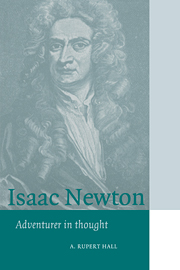Book contents
- Frontmatter
- Contents
- List of Figures
- General Editor's Preface
- Foreword
- Acknowledgement
- 1 The Hopeful Youth, 1642–1664
- 2 “The prime of my age for invention”, 1664–1667
- 3 Widening Horizons, 1667–1669
- 4 The Professor of Mathematics, 1669–1673
- 5 Publication and Polemic, 1672–1678
- 6 Life in Cambridge, 1675–1685
- 7 The Chemical Philosopher, 1669–1695
- 8 The Mathematical Principles of Natural Philosophy, 1679–1687
- 9 Private and Public life, 1685–1696
- 10 Fluxions and Fury, 1677–1712
- 11 Opticks, or a Treatise of Light, 1687–1704
- 12 Life in London, 1696–1718
- 13 A Man of Authority and Learning, 1692–1727
- 14 Later Books, 1706–1726
- 15 Kensington, 1725–1727
- Appendices
- Notes
- Bibliography
- Index
14 - Later Books, 1706–1726
Published online by Cambridge University Press: 12 January 2010
- Frontmatter
- Contents
- List of Figures
- General Editor's Preface
- Foreword
- Acknowledgement
- 1 The Hopeful Youth, 1642–1664
- 2 “The prime of my age for invention”, 1664–1667
- 3 Widening Horizons, 1667–1669
- 4 The Professor of Mathematics, 1669–1673
- 5 Publication and Polemic, 1672–1678
- 6 Life in Cambridge, 1675–1685
- 7 The Chemical Philosopher, 1669–1695
- 8 The Mathematical Principles of Natural Philosophy, 1679–1687
- 9 Private and Public life, 1685–1696
- 10 Fluxions and Fury, 1677–1712
- 11 Opticks, or a Treatise of Light, 1687–1704
- 12 Life in London, 1696–1718
- 13 A Man of Authority and Learning, 1692–1727
- 14 Later Books, 1706–1726
- 15 Kensington, 1725–1727
- Appendices
- Notes
- Bibliography
- Index
Summary
The Queries in Opticks
The last quarter of Newton's life was distinguished from the first three-quarters by the profusion of his written work that was published by himself or by others for him. As always with Newton, none of this publication was fundamentally new: his intellectual effort was devoted to making more perfect what had been published before (as with the Principia and Opticks), to bringing to light from his files writings and correspondence of long ago (as with Commercium Epistolicum), or to polishing for the benefit of posterity the results of studies that he had pursued for decades (as with The Chronology of Ancient Kingdoms Amended and The Prophecies of Daniel and John). In making this point I do not mean quite to assert that, had Newton died in 1705, it would have been possible to reconstruct from his papers all that was subsequently published under his name. Only of the posthumous System of the World would this be exactly true. On most of the late books Newton was always at work, modifying, adding new material from experiments and reading, extending and revising.
Of the Queries appended to the successive editions of Opticks this is particularly true. The main text of this book was not greatly changed when it was republished in Latin in 1706, nor indeed in the subsequent English editions. The Queries, however, developed into the most important series of statements that Newton released to the public about the deepest questions of natural philosophy: the concepts of matter and force, the possible role of an aether and the relation of God to the universe.
- Type
- Chapter
- Information
- Isaac NewtonAdventurer in Thought, pp. 349 - 367Publisher: Cambridge University PressPrint publication year: 1996



